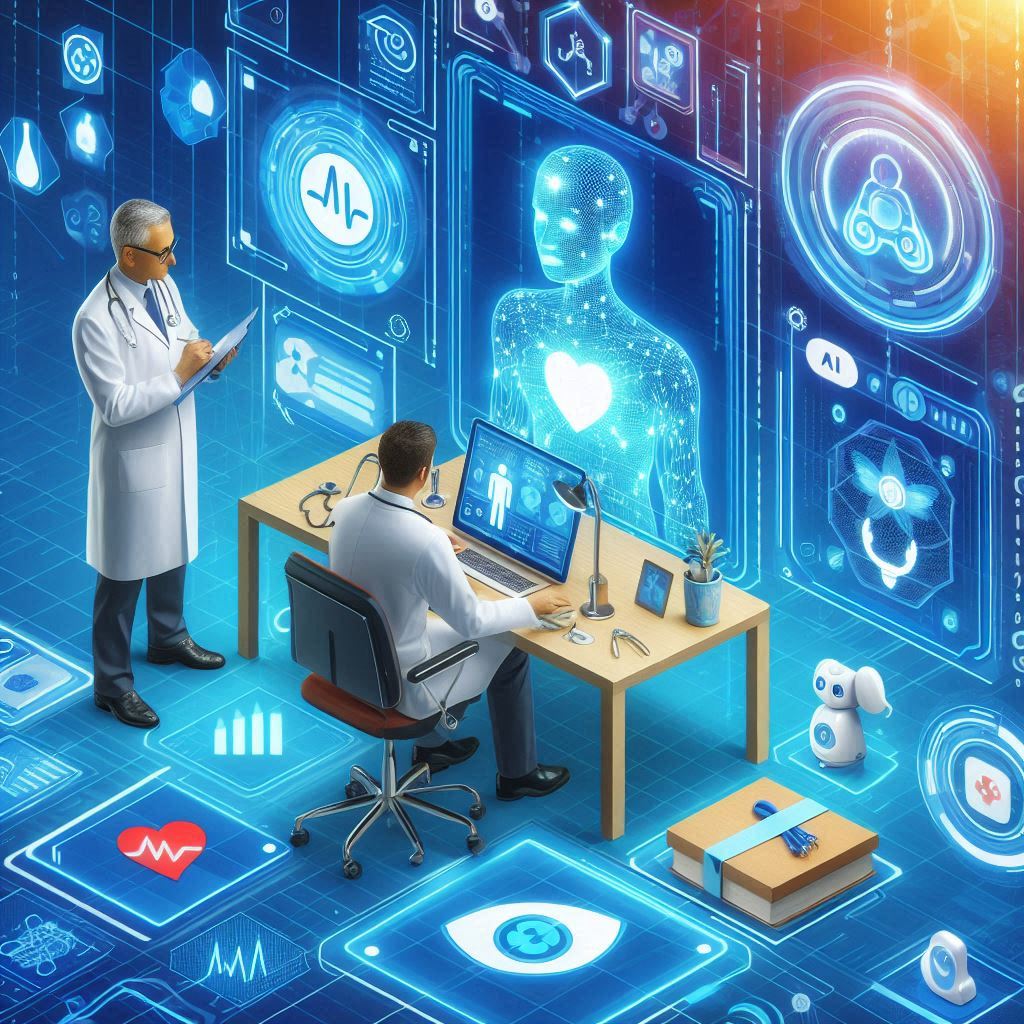Introduction
AI Developments in Healthcare is rapidly transforming the healthcare landscape, revolutionizing patient care, and opening new frontiers in medical research. As we delve into 2024, AI’s role in healthcare has become more pivotal than ever, promising to reshape every aspect of the industry.
AI’s integration into healthcare is not just an incremental change; it’s a paradigm shift. With the power to analyze vast amounts of data, AI is enabling personalized medicine, where treatment plans are tailored to individual genetic profiles and lifestyles. Virtual health assistants, available 24/7, are providing real-time, accurate medical advice, marking a significant leap in patient engagement and care quality.
The potential cost savings are staggering. AI could help reduce healthcare costs in the United States by up to $150 billion annually by 2026 through automation and optimization of clinical workflows. Moreover, AI-driven advancements in drug discovery and patient outcome improvements are setting new benchmarks in the treatment of chronic diseases.
AI Developments to Watch in 2024
As we look ahead, several key AI developments are poised to make headlines in 2024:
- Customized Chatbots: AI giants are developing platforms that allow people to create their own AI models, catering to specific needs without coding skills.
- Multimodal AI: State-of-the-art AI models now process text, images, and videos, unlocking new applications across various sectors.
- Open Source AI: The rise of open-source AI models is challenging proprietary ones, offering more accessible and customizable AI tools.
- AI in API Development: AI is guiding the future of API development, with a focus on model optimization and sustainable data pipelines.
These developments are not just technological milestones; they represent a new era of healthcare where AI is an indispensable ally, enhancing the capabilities of healthcare professionals and improving the lives of patients worldwide.
AI-Powered Predictive Analytics
Predictive analytics powered by AI is not just a technological advancement; it’s a beacon of hope for proactiveAI Developments in Healthcare management. Let’s explore how AI is becoming the crystal ball of healthcare, offering insights that were once beyond our grasp.
Predicting Disease Outbreaks with AI
The onset of AI in predicting disease outbreaks is akin to having a sentinel standing guard against the spread of infectious diseases. In 2024, AI’s predictive prowess is being harnessed to identify patterns and anomalies that precede outbreaks, providing a crucial head start in containment efforts.
For instance, AI models like graph neural networks are now analyzing hospital network data to pinpoint potential transmission hotspots, enabling targeted interventions. These AI systems are adept at identifying silent outbreaks, where patients are colonized but not infected, allowing for cost-effective and focused containment strategies.
AI in Forecasting Individual Patient Health Outcomes
AI’s role in forecasting individual patient health outcomes is transforming the patient-care paradigm. By leveraging large datasets and generative AI, healthcare providers can now predict treatment outcomes with remarkable accuracy.
One breakthrough is the development of AI tools that create digital twins of patients. These virtual models simulate future health scenarios, allowing for personalized treatment plans and preemptive action against potential health issues This approach is not only revolutionizing patient care but also paving the way for more efficient clinical trials and medical research.
As we continue to witness these AI-driven innovations, it’s clear that the future of healthcare is one where predictive analytics plays a central role in both epidemic management and personalized patient care. The promise of AI in healthcare is vast, and 2024 is already showcasing its transformative impact.
Personalized Treatment Plans
The advent of AI-driven personalized medicine is a testament to the incredible strides we’ve made in healthcare technology. Let’s delve into how AI Developments in Healthcare, making it more effective and patient-centric than ever before.
The Rise of AI-Driven Personalized Medicine
AI-driven personalized medicine is at the forefront of a healthcare revolution, offering treatments and preventive strategies tailored to individual genetic, environmental, and lifestyle factors. The convergence of big data, AI, and medical expertise is enabling a shift from a one-size-fits-all approach to a more nuanced, personalized one.
In 2024, AI’s role in personalized medicine has expanded, with AI models now capable of analyzing complex genetic data to predict disease susceptibility and response to treatment. This not only enhances the efficacy of treatments but also minimizes adverse drug reactions, leading to better patient outcomes.
Case Studies of AI in Customizing Patient Care
- AI-Powered Diagnostics in Radiology: A collaboration between Massachusetts General Hospital and MIT developed AI algorithms for radiology, achieving a diagnostic accuracy rate of 94% in detecting lung nodules, surpassing human radiologists.
- Generative AI for Clinical Trials: Healthcare organizations are utilizing generative AI to create patient-specific avatars for clinical trials, enhancing the precision of treatment plans and accelerating the drug development process.
- AI in Operational Efficiency: AI is optimizing healthcare delivery by automating administrative tasks, allowing clinicians to focus more on patient care and less on paperwork.
How can AI address healthcare disparities in personalized medicine?
Artificial Intelligence (AI) is poised to play a crucial role in addressing healthcare disparities, particularly in the realm of personalized medicine. By leveraging its data-processing capabilities, AI can help bridge the gap in healthcare equity through several transformative approaches:
1. Unraveling Social Determinants of Health: AI can analyze complex datasets to identify and address social determinants of health, which are often at the root of healthcare disparities. By understanding these underlying factors, AI can aid in developing targeted interventions that cater to the needs of diverse populations.
2. Enhancing Diagnostic Accuracy: AI’s ability to process and learn from vast amounts of medical data can lead to more accurate diagnoses, reducing the risk of misdiagnosis or delayed treatment that disproportionately affects underserved communities.
3. Supporting Precision Medicine Initiatives: AI algorithms can generate personalized treatment plans by analyzing genetic makeup, lifestyle factors, and medical histories, ensuring that each patient receives the most effective care tailored to their unique profile.
4. Promoting Diversity in Research: AI can help in designing and conducting research that includes diverse population groups, ensuring that the benefits of personalized medicine reach all segments of society.
5. Streamlining Clinical Practice: By automating administrative tasks and optimizing clinical workflows, AI allows healthcare providers to focus more on patient care, potentially reducing disparities in healthcare access and quality.
6. Educating and Empowering Patients: AI-driven tools can provide patients with the knowledge they need to make informed decisions about their health, promoting patient engagement and self-advocacy
AI-Enhanced Electronic Health Records (EHRs)
The integration of Artificial Intelligence (AI) into Electronic Health Records (EHRs) is a significant leap forward in healthcare technology. Let’s explore the advancements and challenges in this domain as we move through 2024.
Improving EHR Systems with AI for Better Data Management
AI is revolutionizing EHR systems by enhancing data management and operational efficiency. In 2024, AI-driven tools are processing extensive datasets, detecting patterns, and supporting healthcare professionals in making more precise diagnoses and treatment choices. Key integrations include:
- Streamlining Administrative Tasks: AI-powered chatbots are handling routine tasks like scheduling appointments and answering patient questions, freeing up valuable time for healthcare providers.
- Improving Clinical Decision-Making: Natural Language Processing (NLP) is automating clinical-note creation and aiding in the analysis of patient data for improved clinical decisions.
- Optimizing Revenue Cycle Management: AI is being used to enhance the financial aspects of healthcare, ensuring that billing and insurance processes are more efficient.
These improvements are not only elevating the standard of care but also paving the way for a more data-driven and patient-centered healthcare experience.
The Impact of AI on Patient Data Privacy and Security
While AI Developments in Healthcare enhances EHR systems, it also brings challenges, particularly in the realms of patient data privacy and security. In 2024, the healthcare industry is grappling with these critical issues:
- Balancing Privacy and Progress: There’s a structured exploration of privacy challenges, emphasizing the effectiveness of encryption and Differential Privacy as methods for preserving patient confidentiality in AI-driven healthcare systems.
- Systemic Oversight and Patient Perceptions: The paper navigates the complex ethical and legal frameworks essential for AI integration in healthcare, examining patient rights and the nuances of informed consent.
- Algorithmic Bias and Discrimination: The urgent need for effective bias detection and mitigation strategies is underscored to build patient trust and ensure equitable healthcare outcomes.

Robotics in Surgery
The integration of robotics into surgery marks a transformative era in medical history. Let’s explore the advancements and the profound impact they are having on surgical procedures.
The Advent of Surgical Robots in Operating Rooms
The year 2024 has seen the operating room become a hub of technological innovation, with surgical robots taking center stage. These sophisticated machines, such as Noah Medical’s Galaxy, are fully integrated systems designed for a variety of procedures, offering unprecedented precision and control. The OTTAVA™ system by Johnson & Johnson MedTech, for example, is set to redefine the surgical experience with its innovative architecture and clinically relevant features, anticipating FDA submission for clinical trials.
These robotic systems are not only enhancing the capabilities of surgeons but also improving patient outcomes with less invasive operations, faster recovery, and healing. The integration of AI into these robotic platforms is expected to further improve navigational capabilities, real-time diagnosis, and even the automation of basic functions.
Improving Surgical Outcomes with AI Precision
AI’s precision in surgery is revolutionizing the field, providing surgeons with enhanced dexterity and control during minimally invasive procedures. In 2024, AI-assisted robotic systems are being deployed across various surgical specialties, including orthopedics, urology, and cardiothoracic surgery.
These AI-powered systems are improving surgical outcomes by enabling more precise cuts, optimal implant placements, and minimized damage to surrounding tissues. As a result, patients are experiencing faster healing, shorter hospital stays, and a reduced risk of infection.
The future of surgery is here, and it’s being shaped by the steady hands of AI-enhanced robotics. As we continue to witness these remarkable advancements, we can expect a new standard of surgical care that prioritizes precision, safety, and patient well-being.
Conclusion
As we reflect on the Trending AI Developments in Healthcare to Watch in 2024, it’s clear that AI is not just a tool but a transformative force reshaping the healthcare landscape. From predictive analytics forecasting disease outbreaks to AI-enhanced EHRs streamlining data management, each innovation marks a step toward a more efficient, personalized, and equitable healthcare system.
The rise of AI-driven personalized medicine and surgical robotics exemplifies the potential of AI to enhance patient care and outcomes. These technologies are not only improving the precision of treatments but also ensuring that healthcare services are accessible to diverse populations, thus addressing disparities in healthcare.
Moreover, the advancements in AI are fostering a new era of collaboration between healthcare professionals and technology, leading to innovations that were once the realm of science fiction. As we continue to navigate the complexities of integrating AI into healthcare, the focus remains on maintaining the delicate balance between innovation, privacy, and ethical considerations.


Usually I do not read article on blogs however I would like to say that this writeup very compelled me to take a look at and do it Your writing style has been amazed me Thank you very nice article